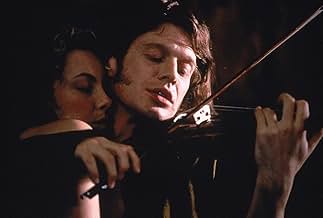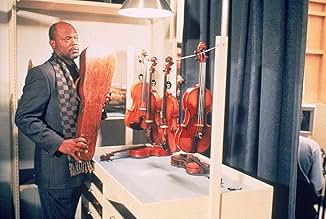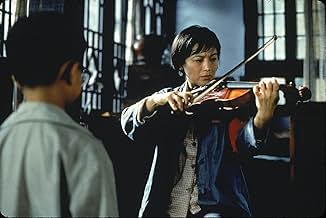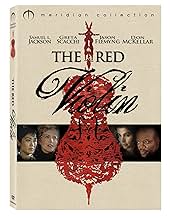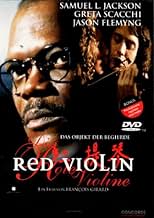AVALIAÇÃO DA IMDb
7,6/10
35 mil
SUA AVALIAÇÃO
Um violino vermelho inspira paixão, percorre três séculos de vários proprietários e países, e finalmente termina em leilão onde pode encontrar um novo proprietário.Um violino vermelho inspira paixão, percorre três séculos de vários proprietários e países, e finalmente termina em leilão onde pode encontrar um novo proprietário.Um violino vermelho inspira paixão, percorre três séculos de vários proprietários e países, e finalmente termina em leilão onde pode encontrar um novo proprietário.
- Direção
- Roteiristas
- Artistas
- Ganhou 1 Oscar
- 20 vitórias e 19 indicações no total
- Direção
- Roteiristas
- Elenco e equipe completos
- Produção, bilheteria e muito mais no IMDbPro
Avaliações em destaque
This is art. Real art. So few films try for this much.
My sadness is that its appeal will be limited to polyglots, musicians, and lovers of costume drama. It's worth so much more than that. Beautifully shot, sensitively scripted and acted, and cleverly executed, this deserves more awards and greater coverage than it's going to get.
9 out of 10. I dock one point because Girard occasionally lets the pace drop to deadly, and because Jason Flemyng and Greta Scacchi irritated me beyond words - but that's not Girard's fault.
My sadness is that its appeal will be limited to polyglots, musicians, and lovers of costume drama. It's worth so much more than that. Beautifully shot, sensitively scripted and acted, and cleverly executed, this deserves more awards and greater coverage than it's going to get.
9 out of 10. I dock one point because Girard occasionally lets the pace drop to deadly, and because Jason Flemyng and Greta Scacchi irritated me beyond words - but that's not Girard's fault.
Literally spanning centuries to unfold its mesmerizing tale, The Red Violin traces the unbelievable history of an acoustically flawless masterpiece crafted in the late 1600s by an Italian master. Co-screenwriters Francois Girard (who directed) and Don McKellar (who acts in the film) structure the movie around a wealth of richly detailed locales, including Vienna, China, and Oxford, and provide a unique modern-day Montreal framework which intertwines with the often tragic history of the instrument to provide the narrative with a rather unique element of mystery. The late-19th century English section shows the film at its most baroque, but each of the finely tuned tales reaches for some truth about music, life, love, and passion -- and that is commendable. Music lovers take note: the sounds that come out of the crimson treasure throughout the course of its journey are utterly thrilling and inspiring.
10bjones
I thought this might be one of those films that would be "good for me" to see. I was mildly intrigued by descriptions of the story I had read and with the trailer, so I thought to take a chance. I took someone very close to me, an actual violin prodigy. Coincidently, her and I have recently been searching for a decent violin for her that is affordable by actual humans, so we could relate to parts of the plot first-hand. We arrived to a very thin theater in one of those mega-complex theaters, and while everyone was queuing up next-door to see the latest blockbuster from Hollywood I settled into an amazingly comfortable seat with an excellent view and prepared for whatever might come.
I was shocked. This film turned out to be clearly one of the best movie going experiences I have had in ages. We see this as the story unfolds and is creatively told through the reading of the violin makers wife's fortune with a deck of Tarot cards. It is the story of a part of the life of a violin; of the humans who would dare to possess her beauty. A masterpiece of a craftsman's art, it is desired by many for it's acoustic perfection. But, as Tolstoy said, "how complete is the delusion that beauty is goodness." Or more interestingly, from Saint Augustine: "Beauty is indeed a good gift of God; but that the good may not think it a great good, God dispenses it even to the wicked." There seems to be a curse on this instrument as it brings ill to those who manage to possess it. This makes the ending especially eerie.
An original, imaginative and thought provoking story that engaged one's mind as American films almost never do. I will not describe more of the plot, it's far too good to ruin. The memory of this film will be one long treasured.
Oh, as for my guest, the honest-to-God prodigy: she said the music was magnificent (it was) even though a real musician could tell the actors weren't playing, it was well done.
I was shocked. This film turned out to be clearly one of the best movie going experiences I have had in ages. We see this as the story unfolds and is creatively told through the reading of the violin makers wife's fortune with a deck of Tarot cards. It is the story of a part of the life of a violin; of the humans who would dare to possess her beauty. A masterpiece of a craftsman's art, it is desired by many for it's acoustic perfection. But, as Tolstoy said, "how complete is the delusion that beauty is goodness." Or more interestingly, from Saint Augustine: "Beauty is indeed a good gift of God; but that the good may not think it a great good, God dispenses it even to the wicked." There seems to be a curse on this instrument as it brings ill to those who manage to possess it. This makes the ending especially eerie.
An original, imaginative and thought provoking story that engaged one's mind as American films almost never do. I will not describe more of the plot, it's far too good to ruin. The memory of this film will be one long treasured.
Oh, as for my guest, the honest-to-God prodigy: she said the music was magnificent (it was) even though a real musician could tell the actors weren't playing, it was well done.
I had never heard of this movie until I heard about it on the radio. I listen to classical music, and the staion was praising Joshua Bell (an ohio native) on his perfomance of the music. I was curious and saw it when it came on video. not only did i fall in love with the movie itself, but also the music. it was soothing, passionate, and brutal all at the same time. Many people I have talked to have said that Le Violon Rouge was just some crappy indie movie. However, the music is as beautiful as the plot. The storyline and the way it was presented in the form of different people who wanted the violin for different reasons was not so much genius, but different and fitting.
I saw this film the same day it came highly recommended to me by a coffee shop friend who couldn't stop gushing about it. While this guy is also a member of the Academy and has steered me to some pretty good picks in the past, I walked into the theater fearing the usual letdown that invariably follows going into a film with overly high expectations (i.e. The English Patient, The Truman Show, etc.) This film not only managed to exceed my expectations, it restored my faith in the magic and mystery of cinema altogether.
We start with a rather simple but cleverly structured story about a very unique red violin that emblematically (and quite literally for that matter) takes on the heart and fate of a 16th century Italian woman as it passes across several centuries and continents on its way to the auction block in present day Montreal. The unfolding vignettes reveal more and more about the nature of this instrument and, when strung together in the bigger picture, play out like finely orchestrated movements of a great sonata; each movement plucking out its own stirring and poignant variation on theme. I was so swept up in the majesty and spectacle of this film that it didn't even occur to me until much later that the violin is nothing less than a personification of beauty itself (okay, okay, maybe I'm starting to overly deconstruct things here in retrospect, but the parallels are too perfect to remain unexplored). It's fascinating to watch both the transformative and destructive power of this beauty as it's placed into the hands of a sensitive young boy, a self absorbed musical protege, and a remorseful ring leader of a totalitarian regime. Much praise goes to director Francois Girard in how he refrained from overplaying the social and moral commentary, repeating this theme at mostly an emotional level rather than an intellectual one -- much in the same way that beauty itself, to some degree anyway, defies analytical discussion and belongs in the realm of pure and simple experience. You obviously can't dissect it, as co-writer Don McKellar¹s onscreen character thought to do, and so it remains as it was in it's original form: timeless, magical, elusive. The stuff that pompous nobility and rich collectors the world over will offer a king's ransom for and still never manage to posses in the end.
Performances were good to great all around. It's hard to go wrong with Samuel L. Jackson in a leading role and I appreciated the fact that the actors actually appeared to be playing the violin on camera, as opposed to watching the typical hokey cutaways and cheat shots often associated with onscreen musical performances; nauseating contrivances that always tear down the wall of suspended disbelief with a resounding crash. The costuming, set design and cinematography were absolutely stunning (Oscar nominations soon to follow I'm sure) without taking center stage from the story. I especially loved the amazing period recreations of China and Austria. I felt like I was fully transported in both space and time to these places and walking among people who really belonged there.
Overall I would rate this one as a true film classic on the level of masterpiece. Perhaps this is in part due to my love for music and the undeniable fact that, being the sentimental guy that I am, I'm always a sucker for haunting open-ended films like this where you leave the theater in a half daze, pondering all the implications, mesmerized by the lingering imagery. I'm still speculating about the future of Mr. Moritz and what will ultimately happen when beauty is placed into the hands of our modern world.
We start with a rather simple but cleverly structured story about a very unique red violin that emblematically (and quite literally for that matter) takes on the heart and fate of a 16th century Italian woman as it passes across several centuries and continents on its way to the auction block in present day Montreal. The unfolding vignettes reveal more and more about the nature of this instrument and, when strung together in the bigger picture, play out like finely orchestrated movements of a great sonata; each movement plucking out its own stirring and poignant variation on theme. I was so swept up in the majesty and spectacle of this film that it didn't even occur to me until much later that the violin is nothing less than a personification of beauty itself (okay, okay, maybe I'm starting to overly deconstruct things here in retrospect, but the parallels are too perfect to remain unexplored). It's fascinating to watch both the transformative and destructive power of this beauty as it's placed into the hands of a sensitive young boy, a self absorbed musical protege, and a remorseful ring leader of a totalitarian regime. Much praise goes to director Francois Girard in how he refrained from overplaying the social and moral commentary, repeating this theme at mostly an emotional level rather than an intellectual one -- much in the same way that beauty itself, to some degree anyway, defies analytical discussion and belongs in the realm of pure and simple experience. You obviously can't dissect it, as co-writer Don McKellar¹s onscreen character thought to do, and so it remains as it was in it's original form: timeless, magical, elusive. The stuff that pompous nobility and rich collectors the world over will offer a king's ransom for and still never manage to posses in the end.
Performances were good to great all around. It's hard to go wrong with Samuel L. Jackson in a leading role and I appreciated the fact that the actors actually appeared to be playing the violin on camera, as opposed to watching the typical hokey cutaways and cheat shots often associated with onscreen musical performances; nauseating contrivances that always tear down the wall of suspended disbelief with a resounding crash. The costuming, set design and cinematography were absolutely stunning (Oscar nominations soon to follow I'm sure) without taking center stage from the story. I especially loved the amazing period recreations of China and Austria. I felt like I was fully transported in both space and time to these places and walking among people who really belonged there.
Overall I would rate this one as a true film classic on the level of masterpiece. Perhaps this is in part due to my love for music and the undeniable fact that, being the sentimental guy that I am, I'm always a sucker for haunting open-ended films like this where you leave the theater in a half daze, pondering all the implications, mesmerized by the lingering imagery. I'm still speculating about the future of Mr. Moritz and what will ultimately happen when beauty is placed into the hands of our modern world.
Você sabia?
- CuriosidadesChristoph Koncz (as Kaspar Weiss the orphan virtuoso) was only nine years old when featured in this movie. He is an Austrian-Hungarian classical musician that became an internationally-renowned violinist and conductor.
- Erros de gravaçãoThe substance used to give the violin its color would not actually work in real life. The substance does not mix into varnish, and would quickly coagulate and oxidize to a dark brown or black color if it were actually used as the movie implies.
- Citações
Charles Morritz: What do you do when the thing you most wanted, so perfect, just comes?
- Trilhas sonorasO Richard! O mon Roi!
from "Richard Coeur de Lion"
Composed by André-Modeste Grétry
Principais escolhas
Faça login para avaliar e ver a lista de recomendações personalizadas
Detalhes
- Data de lançamento
- Países de origem
- Idiomas
- Também conhecido como
- El violín rojo
- Locações de filme
- Empresas de produção
- Consulte mais créditos da empresa na IMDbPro
Bilheteria
- Orçamento
- US$ 18.000.000 (estimativa)
- Faturamento bruto nos EUA e Canadá
- US$ 10.019.109
- Fim de semana de estreia nos EUA e Canadá
- US$ 47.415
- 8 de nov. de 1998
- Faturamento bruto mundial
- US$ 10.019.109
- Tempo de duração2 horas 10 minutos
- Cor
- Mixagem de som
- Proporção
- 1.85 : 1
Contribua para esta página
Sugerir uma alteração ou adicionar conteúdo ausente



